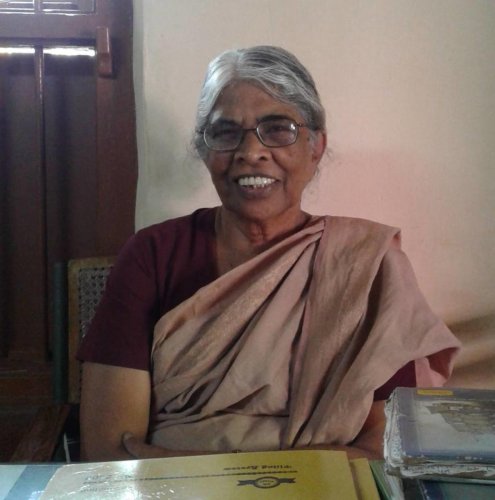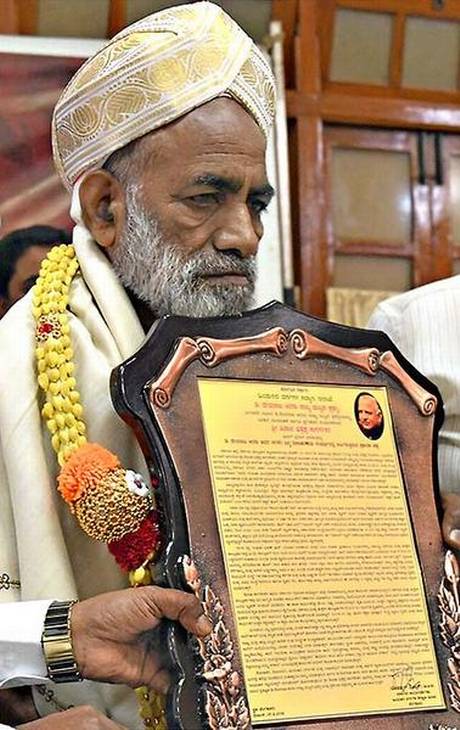The 29-year-old constable has made it his mission to encourage and educate people about organ and blood donation and sign them up for the cause.

Haveri :
As a policeman, it is Karabasappa Manohar Gondi’s duty to save lives. Tackling crime is, however, not the only way the constable tries to achieve it. Gondi is often the first contact point for most people in the area whenever the need for blood donation arises.
The 29-year-old constable, currently attached to Adur Police Station in Hangal taluk of Haveri district, has made it his mission to encourage and educate people about organ and blood donation, and sign them up for the cause.
For the last five years, he has been spreading awareness about the subject on every possible occasion in the area, and has led over 670 villagers in Hangal taluk to pledge their eyes while 11 people, including women, have pledged to donate their bodies. His mobile number is now widely in circulation, and he is often the first person called up by people during a medical emergency.
Gondi, who is now a household name in his native village of Akkialur of Hangal taluk and the surrounding region due to his zeal to save lives, has created a group of about 1,500 like-minded people who are ready to donate blood at any time. His efforts have led to a number of people becoming regular donors, such as Akkialur Virkat Mutt pontiff Shivabasav Swamiji, who donated blood for the fifth time on December 6, and Tanaji Gorphade of Adur village, who has donated blood 30 times so far.
Gondi’s wife and his three-and-a-half-year-old son, Hoysala, have also pledged their eyes and other organs.
All the people who have pledged their eyes are enrolled for the cause with M M Joshi Eye Hospital in Hubballi. His efforts have led to a restoration of eyesight in nine persons who suffered from corneal defect in Hubballi and Sirsi.
Agricultural labour Fakkeriappa Talwar of Gejjihalli village in Hangal Taluk, who injured his right eye while he was cutting maize crop, cannot thank him enough. “I’m a poor man and did not have the means to pay Rs 40,000 for an eye transplant. Hence I approached Karabasappa and got my eye operated upon. I am thankful to Karabasappa for the favour,” says Talwar, who underwent an eye transplant in August this year at Shankar Eye Hospital, Shivamogga.

Gondi’s commitment to the cause took roots in his mind when he faced a sight problem in childhood. He underwent laser eye surgery in 2009 before joining the police department. “I always thought of doing something for the society in terms of eye care and eye donation,” says Gondi. “After I joined the police force, I started organising eye camps in my free time and convinced people to sign up for donations.”
Gondi organised the first eye check-up camp and donation drive at Akkialur five years ago.
He now holds an eye camp for villagers on the last Sunday of every month. He also visits schools to make children aware of the significance of blood and organ donation. In the last few years, he has also started using the social media to promote the cause. Gondi has Facebook, Twitter, WhatsApp and Instagram accounts on which he posts updates about eye camps, etc.
“In the beginning, it was not easy to persuade people in small towns and villages about donating their eyes. I had to convince them slowly before villagers started signing up,” says Gondi, who is a graduate and a diploma holder in education. He often takes the help of mythological stories to dispel superstitions and taboos from people’s minds, narrating to them, for instance, how Bedara Kannappa donated both his eyes to Lord Shiva.
“Initially it was very difficult to influence them, and they even made fun. But I did not lose hope,” he says. “I ask people to pledge their eyes on occasions such as marriages, anniversaries and birthdays. This will send a positive message in the society,” he adds.
Gondi’s mobile phone numbers — 8861118881 or 8088318888 — are also used by people during a medical emergency.
“Gondi has a large network of friends who have enrolled themselves for blood donation. The group comprises about 1,800 blood donors in eight districts of Karnataka. Whenever any patient requires blood, we call Gondi and we are never disappointed,” Shankar, a villager from Adur, says.
Inspiring Act
All the members of Gondi’s family have pledged their bodies to Haveri Sindagi Shantveereshwara Ayurveda Medical College. Inspired by their act, several families from Akkialur, Haveri and Shiggavi have also come forward to sign up for organ donation at the college. Mahantesh Salavatagi and Parvatewwa Shankrappa Bellad, both residents of Akkialur village, say, “We have pledged to donate our eyes willingly. No one should suffer from lack
of vision.”
Green Thumb
Karabasappa Gondi is also passionate about environment conservation. He has so far planted 16 trees at his house in Akkialur village in memory of his ancestors.
source: http://www.newindianexpress.com / The New Indian Express / Home> States> Karnataka / by Gangadhar Hugar / Express News Service / December 30th, 2018







